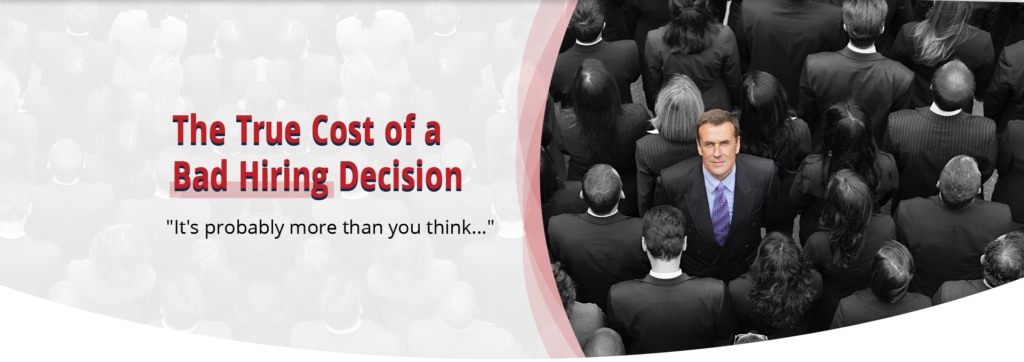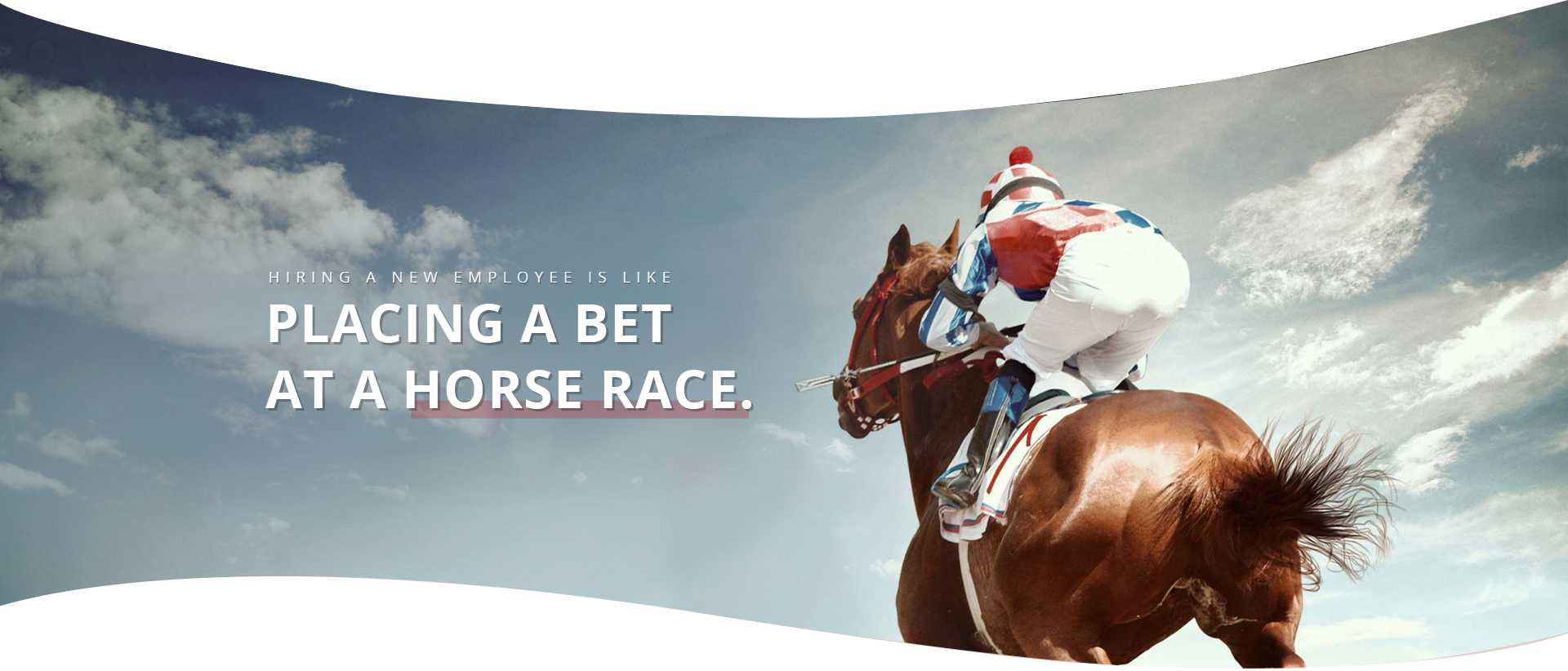

You research the horse, the jockey, the conditions of the track, and you’ve shopped the odds. You have put in all the necessary work before placing the bet on what you believe to be the horse that will win you money. Yet, even the most experienced gamblers will have regular losses.
Not every bet at the track is going to make you money. The same can be said of hiring a new employee for your business. You’ve researched the candidate, talked to their references, performed a background check, you’ve done the necessary work beforehand, and they still turn out to be a bad hire.
Bad hires can happen to good companies, but a company is only as good as its employees. Making smart and informed hiring decisions can influence an entire company’s culture, which is why it’s crucial to understand the impact of a bad hire.
The list of characteristics in a bad hire can include problems such as a failure to produce quality work, the inability to work well with others, negative attitudes, attendance issues, customer or client complaints, and a failure to meet deadlines. Problems such as these will have a direct and indirect impact on the rest of the business.
While some effects can be measured financially, there are others issues that can permeate throughout a workplace’s culture. It’s important to talk about the financial impacts, but the other problems are just as critical when examining the effects of a bad hire.
Financial Cost of a Bad Hire

For larger companies, this number can be minimal, but for a startup with lean operating costs, this has the potential to destroy an annual budget. A CEO of a smaller company, like a startup, is very involved in the hiring process and will often perform the final interview with a candidate. This step gets lost the bigger a company is, with the big boss being less likely to be the one making the hiring decision.
But, even when recruiters and hiring manager are the ones in charge of hiring, the financial burden of these decisions still rests on the C-suite partners. The money lost on a bad hire is not coming from a recruiter’s paycheck, which makes them less emotionally involved in the betting process. The less emotionally involved in the bet, the more likely they are to bet on the wrong horse.
Do you trust your recruiters and hiring managers to place a bet on the right candidate using your money? If your recruiters aren’t specialized in tech, then it’s unlikely they’ll be able to perform an accurate assessment of the candidate.
After all, a candidate might look really good on paper – and say the right things to the hiring manager – but not have the technical expertise your project requires. In that case, the recruiter can do their absolute best, but you will likely still end up with a losing horse. You need to work with a specialized technical recruiter.
The financial cost of a bad hire goes beyond the initial bet placed on a candidate. There are costs directly related to recruiting candidates. There is valuable time and money spent on writing an enticing job posting, paying job board websites to host the job ad, following up with potential hires, scheduling interviews, and more. When you make a bad hire, those costs can cost a business potential revenue.
Cost to the Team
While the true cost of a bad hire is clearly measurable in the company’s bottom line, it ends up affecting so much more. Many smart businesses rank a bad hire’s other impacts, like loss of morale and productivity issues, as more costly than the monetary losses. A bad hire will negatively impact the other employees on their team.
When a bad hire joins a team, the employees you consider to be reliable, motivated, and high performers are likely to suffer. They can become disengaged from the rest of the team and eventually the organization. It’s well known that self-motivation relies on environmental factors, so if the work environment becomes negative, it will be even harder to feel motivated at work.
Cost to the Team
While the true cost of a bad hire is clearly measurable in the company’s bottom line, it ends up affecting so much more. Many smart businesses rank a bad hire’s other impacts, like loss of morale and productivity issues, as more costly than the monetary losses. A bad hire will negatively impact the other employees on their team.
When a bad hire joins a team, the employees you consider to be reliable, motivated, and high performers are likely to suffer. They can become disengaged from the rest of the team and eventually the organization. It’s well known that self-motivation relies on environmental factors, so if the work environment becomes negative, it will be even harder to feel motivated at work.
A bad hire can affect a team’s motivation as well. When a teammate isn’t pulling their weight, it makes it difficult for the others to meet their goals. Your top employees will get burned out trying to make up for the loss in productivity and become disgruntled with the extra work. A lot of the times, you’ll end up losing your top performers which can have a generational impact and be costly to repair.

The problems with a bad hire will work their way up the chain of command and result in time lost for the managers tasked with supervising them. A good manager will spend time with an underperforming employee to coach them and help them improve. While this is a great strategy, with a bad hire it can backfire. The time spent on supervising a bad hire could have been used for more important tasks.

Loss of Reputation
” It takes 20 years to build a reputation and five minutes to ruin it ” – Warren Buffet
Even if your business hasn’t been around for long, the meaning remains the same: A bad hire will impact a company’s reputation. Since a bad hire is known to have a negative influence on their teammates, there’s also the risk of customers and clients becoming unsatisfied with the quality of work.
A decline in quality of work can not only damage the company’s reputation, but it can also lead to losing clients. A disgruntled former client that writes a bad review will affect your ability to attract new clients. A bad employee who is then fired could end up writing a bad review on a job hiring site, which reduces your ratings, impedes future hiring, and damages your employer brand.
Loss of Reputation

A decline in quality of work can not only damage the company’s reputation, but it can also lead to losing clients. A disgruntled former client that writes a bad review will affect your ability to attract new clients. A bad employee who is then fired could end up writing a bad review on a job hiring site, which reduces your ratings, impedes future hiring, and damages your employer brand.
A bad bet on the wrong horse can impact your business’s bottom line. It’s not easy finding qualified candidates that will become your next high performer. It’s important to understand the true cost of a bad hire and the aspects of the overall business that they can negatively affect. By being selective, and having a strong hiring process in place, you can avoid the pitfalls of hiring the wrong candidate.

DevStaff Canada can help your company avoid making a bad hire in the first place, with our vast experience in our field, we know firsthand how challenging it is to hire talented technical candidates. That’s why we’ve now implemented a rigorous candidate selection process. This allows us to guarantee high-quality interviews, saving our clients’ time and the headache of bad interviews.
Unlike many large staffing agencies, your business isn’t just a number to us. Our staffing process gives clients a personalized, boutique feel while knowing they’ll get interviews with the crème-de-la-crème of the technology industry. We’ll pair you with a personal recruiter, who will take the time to figure out your needs and match you with the strongest candidates for your business.



